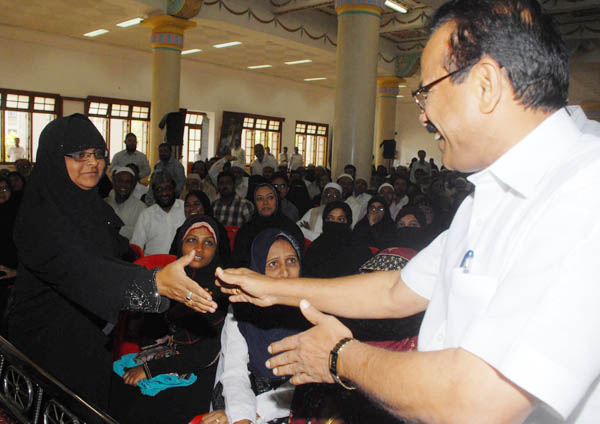January this year, the Regional Passport Office (RPO) had started booking about 350 slots per day for Haj pilgrims due to a new rule that says travellers need to possess a passport to apply for Haj pilgrimage organised by the Haj Committee of India.
As a result, special counters were set up and those passports were processed on a priority basis.
From January, 350 appointments were set aside for Haj applicants and in March they were scaled down to about 120 a day.
On the downside, this had inconvenienced other applicants.

Chief Minister D V Sadananda Gowda greets Haj pilgrims at the computerised selection of Haj pilgrims at the Vidhana Soudha in Bangalore on Wednesday.
Slots that opened online 36 hours prior to the appointment date, disappeared in less than three minutes and applicants complained of having to try for more than 10 days continously before getting lucky enough to get an appointment.
Faced with a lot of complaints, the RPO?later opened their office to applicants to reduce the waiting time. Through this system, those applying through tatkal and those applying through normal procedure but needed the passport immediately for medical, education or employment reasons, could come to the Passport office directly. They were issued tokens so that they could be accommodated with an appointment at the Passport Seva Kendras, either on the same day or the next.
“This system will continue even though we have stopped accepting applications for Haj about 15 days ago. The demand has still not reduced, probably because of the holiday season,” Regional Passport Office K J?Srinivasa said.
While applications for Haj have stopped, those travelling on Umrah to Haj through private operators continue to apply for passports.
These applications, however, will not be treated on priority basis. Srinivasa added that there was no plan to increase the number of appointments despite growing demand, as they had reached the maximum at all the centres in Bangalore, Mangalore and Hubli.
Bowing to increasing demand for passports, the Ministry of External Affairs (MEA)?is likely to operate a mini Passport Seva Kendra from Gulbarga in the next few months. Unlike the other mainstream PSKs where some of the activities are outsourced to Tata Consultancy Services (TCS), the mini PSK will only use the software created by TCS and will be staffed by the MEA.
Chief Minister D V Sadananda Gowda greets Haj pilgrims at the computerised selection of Haj pilgrims at the Vidhana Soudha in Bangalore on Wednesday.





Comments
Add new comment